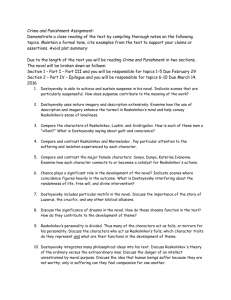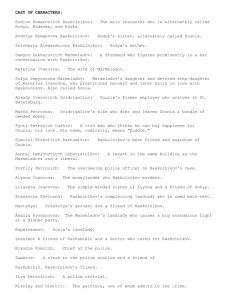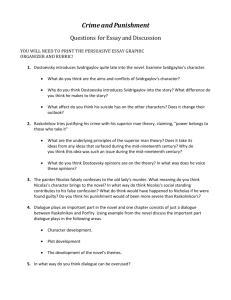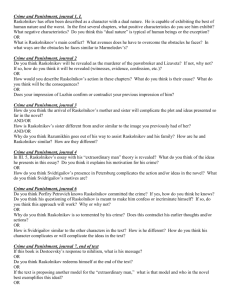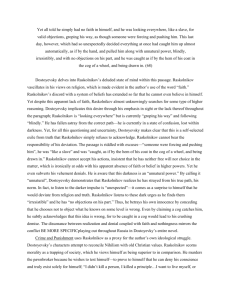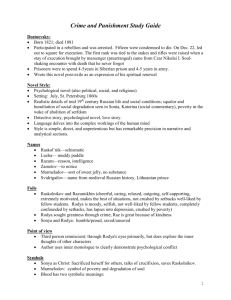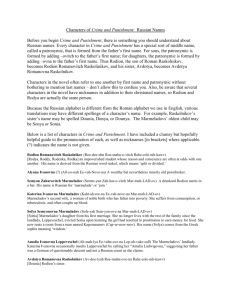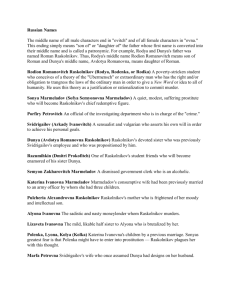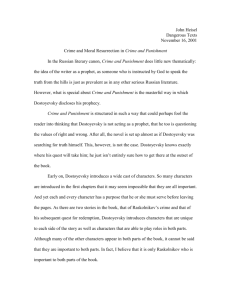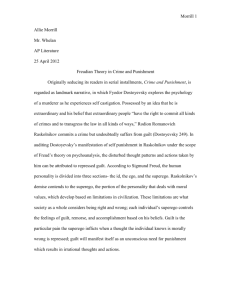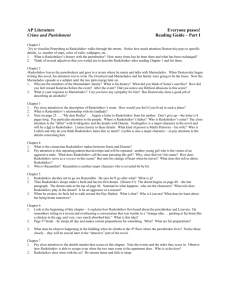Crime and Punishment by Fyodor Dostoyevsky Handout
advertisement
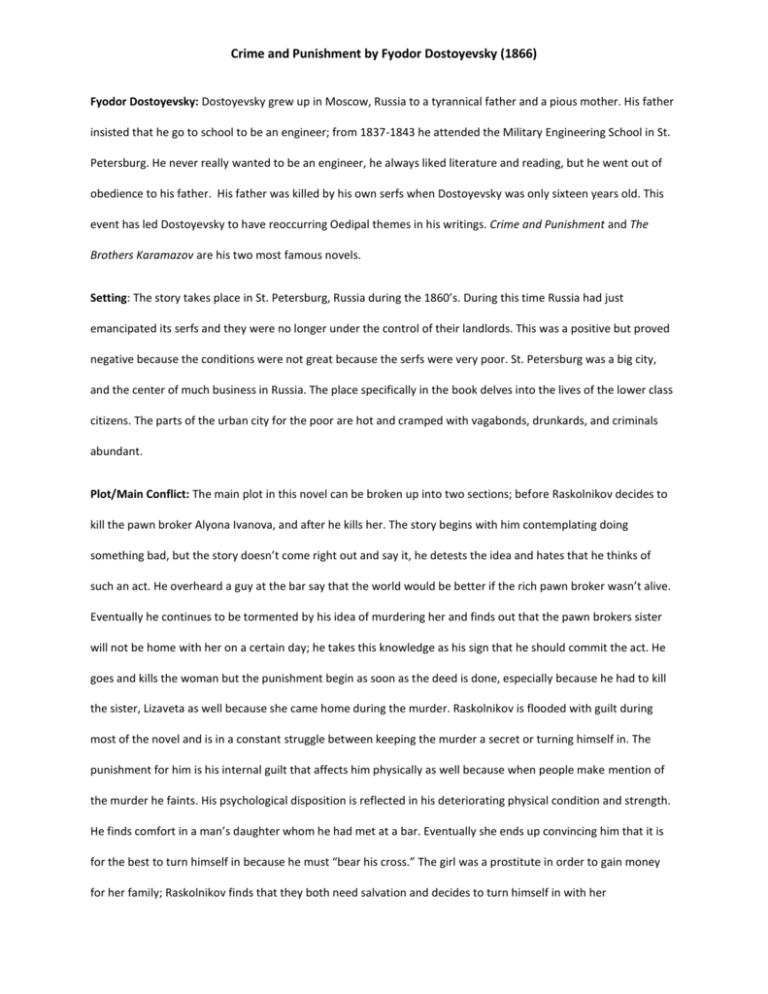
Crime and Punishment by Fyodor Dostoyevsky (1866) Fyodor Dostoyevsky: Dostoyevsky grew up in Moscow, Russia to a tyrannical father and a pious mother. His father insisted that he go to school to be an engineer; from 1837-1843 he attended the Military Engineering School in St. Petersburg. He never really wanted to be an engineer, he always liked literature and reading, but he went out of obedience to his father. His father was killed by his own serfs when Dostoyevsky was only sixteen years old. This event has led Dostoyevsky to have reoccurring Oedipal themes in his writings. Crime and Punishment and The Brothers Karamazov are his two most famous novels. Setting: The story takes place in St. Petersburg, Russia during the 1860’s. During this time Russia had just emancipated its serfs and they were no longer under the control of their landlords. This was a positive but proved negative because the conditions were not great because the serfs were very poor. St. Petersburg was a big city, and the center of much business in Russia. The place specifically in the book delves into the lives of the lower class citizens. The parts of the urban city for the poor are hot and cramped with vagabonds, drunkards, and criminals abundant. Plot/Main Conflict: The main plot in this novel can be broken up into two sections; before Raskolnikov decides to kill the pawn broker Alyona Ivanova, and after he kills her. The story begins with him contemplating doing something bad, but the story doesn’t come right out and say it, he detests the idea and hates that he thinks of such an act. He overheard a guy at the bar say that the world would be better if the rich pawn broker wasn’t alive. Eventually he continues to be tormented by his idea of murdering her and finds out that the pawn brokers sister will not be home with her on a certain day; he takes this knowledge as his sign that he should commit the act. He goes and kills the woman but the punishment begin as soon as the deed is done, especially because he had to kill the sister, Lizaveta as well because she came home during the murder. Raskolnikov is flooded with guilt during most of the novel and is in a constant struggle between keeping the murder a secret or turning himself in. The punishment for him is his internal guilt that affects him physically as well because when people make mention of the murder he faints. His psychological disposition is reflected in his deteriorating physical condition and strength. He finds comfort in a man’s daughter whom he had met at a bar. Eventually she ends up convincing him that it is for the best to turn himself in because he must “bear his cross.” The girl was a prostitute in order to gain money for her family; Raskolnikov finds that they both need salvation and decides to turn himself in with her Crime and Punishment by Fyodor Dostoyevsky (1866) encouragement. He goes to prison in Siberia but is comforted by the fact that now he doesn’t have the guilt that burdened him and was beginning to burden and make his family upset as they found out about it. Characters: Raskolnikov (protagonist)- Young, handsome man who believes himself to be superior to others. He constantly has internal battles and feels guilty almost always. Alyona Ivanovna (murder victim)- Old and ugly pawnbroker Razumihin- A good friend of Raskolnikov and has a good temperament; he takes care of him when he has his little mental episodes. He gets extremely jealous of other men who talk to Dounia because he wants her for himself. Porfiry Petrovic- Investigator that understands Raskolnikov’s psychology and guilt. Svidrigailo- Neighbor who eavesdrops on Raskolnikov and finds out he is the murderer, uses it to try to get with Dounia. Marmeladov- A drunkard who’s ruining his family by his drinking. Sonya- Marmeladov’s daughter and Raskolnikov’s love; takes care of the family as a prostitute and convinces Raskolnikov to confess to the murder. She follows him to Siberia where she says she will wait and visit him. Authors Central Question (Theme): The main theme was psychological aspects that were especially emphasized in the mental insights of Raskolnikov. The guilt that Raskolnikov felt throughout the entire novel and his indecisiveness with what he wanted to do. The novel seems to be saying that the real punishment is not the prison time but rather the mental stress that the criminal must endure until the time that he is caught. Raskolnikov underwent severe guilt that caused him a lot of trouble in his life because it not only psychologically affected him, but also physically and affected his family and friends. The other main theme goes along with the psychological theme because the poverty theme seemed to affect the people psychologically too. The poor Marmeladov family contributed a lot to this theme with their family being torn apart by their economic instability. Their lives were ruined because of the choices they made because they were poor. The father turned to drinking, the mother simply had psychological issues, and the daughter turned to prostitution all because of their economic conditions. Another prime example is Raskolnikov killing Alyona who was rich while he was poor. This seems to say that people do radical desperate things because of their impoverished condition.
